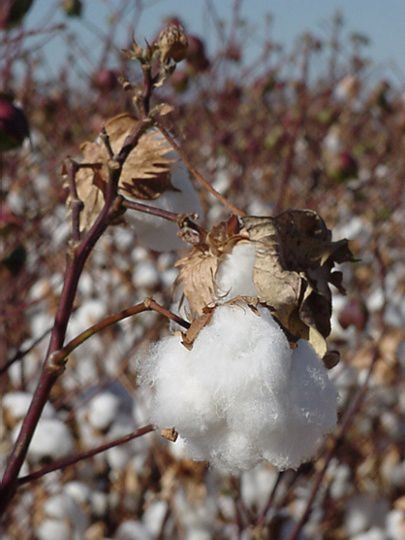Arizona Agriculture and Biotechnology: The Pros and Cons
Published
4/25/2014
By Katie Aikins and Julie Murphree, Arizona Farm Bureau: On any issue, it’s always wise to look at the “Pros and Cons” of a situation. At Arizona Farm Bureau we do this all the time. And, in regards to biotechnology in agriculture, we’re continually evaluating the science.
To really evaluate the biotechnology issue, ask yourself questions. What are some of the other things that are being said about biotechnology in agriculture, or genetically modified organisms (

Arizona Cotton is our most common biotech crop in this state.
The Cons
One of the reasons biotechnology companies must go through years of research on a product is because they must carefully evaluate the health, environmental and safety aspects of a new product before going to market.
Arizona agriculture’s farmers and ranchers make the same considerations when trying a new or improved tool in agriculture. They must ask, “what’s its impact?
For example in regards to our health, certain genes may be allergens – consider some of the things you might be allergic to? If you had a peanut allergy you might be concerned that a gene from a peanut was used in your squash or any other “transgenic” (contains a gene or genes which have been artificially inserted instead of the organism acquiring them through traditional cross-breeding) organism.
Regarding allergens and our health, when it comes to biotechnology, we can rest easy knowing that 1.) None of the 8 most common allergens (such as a peanut allergy) are used for transgenic organisms and 2.) part of the testing of these products is to determine if an allergen exists. If one is found, the product is abandoned, no longer tested and does not receive approval.
Unintended harm to wildlife and beneficial insects relates to the environmental impact consideration – this is a legitimate concern. However, is this a concern that is specific only to transgenic organisms? Can wild, “natural,” or native plants also posses this threat? Yes.
So environmental considerations should not be exclusive to just transgenic organisms. Even the organic industry must consider (at least should) consider environmental impacts.
Insect Resistance is another area of concern – again, a legitimate concern. However, is it specific to transgenic organisms? Do we have insects today that become resistant to plants’ natural defense systems? Yes. Do we have insects today that become resistant to pesticides that are used? Again, not a fear that is specific to transgenic organisms or biotechnology.
The Pros
There are some proven benefits of transgenic organisms and GMOs in general. According to supporters of these products and this technology:
The peer-reviewed and science-community-supported science
- Both the Food and Drug Administration and the National Academies of Science
conclude that genetically modified foods pose no harm not also found in conventional or organic foods. - Bioengineered foods have been consumed for close to 20 years, and during that time, no overt consequences on human health have been reported and or/substantiated in peer-review research and literature.
- Transgenic foods are nutritionally indistinguishable from their non-transgenic counterparts, and in fact, they can be used to enhance nutrition in poorer parts of the world.
- The scientific world is split on whether “transgenes” can spread to other species.
- Science consistently shows that transgenic products pose no threat to our health.
Whether it’s from nature or slightly engineered by modern science, agriculture and food stakeholders must always consider the health, environmental and safety benefits of a new product. Pros and cons exist in all environments. To say that the big, bad and ugly is the exclusive domain of GMOs is just wrong. The big, bad and ugly can come out of nature too. Snake venom is “natural” but it will kill you.
Join our Family!